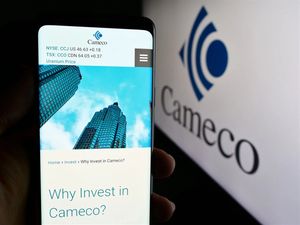First Trust Advisors L.P. (“FTA”) announces the declaration of distributions for 3 exchange-traded fund(s) (each a “Fund,” collectively, the “Funds”) advised by FTA.
The following dates apply to today's distribution declarations:
Expected Ex-Dividend Date: |
|
|
December 15, 2023 |
Record Date: |
|
|
December 18, 2023 |
Payable Date: |
|
|
December 29, 2023 |
Ticker |
Exchange |
Fund Name |
Frequency |
Ordinary
|
ACTIVELY MANAGED EXCHANGE-TRADED FUNDS |
||||
First Trust Exchange-Traded Fund V |
||||
FMF |
NYSE Arca |
First Trust Managed Futures Strategy Fund |
Quarterly |
$0.4144 |
|
||||
First Trust Exchange-Traded Fund VII |
||||
FAAR |
Nasdaq |
First Trust Alternative Absolute Return Strategy ETF |
Quarterly |
$0.2566 |
FTGC |
Nasdaq |
First Trust Global Tactical Commodity Strategy Fund |
Quarterly |
$0.2115 |
|
|
|
|
|
FTA is a federally registered investment advisor and serves as the Fund's investment advisor. FTA and its affiliate First Trust Portfolios L.P. ("FTP"), a FINRA registered broker-dealer, are privately-held companies that provide a variety of investment services. FTA has collective assets under management or supervision of approximately $201 billion as of November 30, 2023 through unit investment trusts, exchange-traded funds, closed-end funds, mutual funds and separate managed accounts. FTA is the supervisor of the First Trust unit investment trusts, while FTP is the sponsor. FTP is also a distributor of mutual fund shares and exchange-traded fund creation units. FTA and FTP are based in Wheaton, Illinois.
You should consider the investment objectives, risks, charges and expenses of a Fund before investing. Prospectuses for the Funds contain this and other important information and are available free of charge by calling toll-free at 1-800-621-1675 or visiting https://www.ftportfolios.com. A prospectus should be read carefully before investing.
Principal Risk Factors: You could lose money by investing in a fund. An investment in a fund is not a deposit of a bank and is not insured or guaranteed. There can be no assurance that a fund’s objective(s) will be achieved. Investors buying or selling shares on the secondary market may incur customary brokerage commissions. Please refer to each fund’s prospectus and Statement of Additional Information for additional details on a fund’s risks. The order of the below risk factors does not indicate the significance of any particular risk factor.
Past performance is no assurance of future results. Investment return and market value of an investment in a fund will fluctuate. Shares, when sold, may be worth more or less than their original cost.
A fund’s shares will change in value, and you could lose money by investing in a fund. An investment in a fund is not a deposit of a bank and is not insured or guaranteed by the Federal Deposit Insurance Corporation or any other governmental agency. There can be no assurance that a fund’s investment objectives will be achieved. An investment in a fund involves risks similar to those of investing in any portfolio of equity securities traded on exchanges. The risks of investing in each fund are spelled out in its prospectus, shareholder report, and other regulatory filings.
Market risk is the risk that a particular security, or shares of a fund in general may fall in value. Securities are subject to market fluctuations caused by such factors as general economic conditions, political events, regulatory or market developments, changes in interest rates and perceived trends in securities prices. Shares of a fund could decline in value or underperform other investments as a result. In addition, local, regional or global events such as war, acts of terrorism, spread of infectious disease or other public health issues, recessions, natural disasters or other events could have significant negative impact on a fund.
Current market conditions risk is the risk that a particular investment, or shares of the fund in general, may fall in value due to current market conditions. As a means to fight inflation, the Federal Reserve and certain foreign central banks have raised interest rates and expect to continue to do so, and the Federal Reserve has announced that it intends to reverse previously implemented quantitative easing. Recent and potential future bank failures could result in disruption to the broader banking industry or markets generally and reduce confidence in financial institutions and the economy as a whole, which may also heighten market volatility and reduce liquidity. Ongoing armed conflicts between Russia and Ukraine in Europe and among Israel, Hamas and other militant groups in the Middle East, have caused and could continue to cause significant market disruptions and volatility within the markets in Russia, Europe, the Middle East and the United States. The hostilities and sanctions resulting from those hostilities have and could continue to have a significant impact on certain fund investments as well as fund performance and liquidity. The COVID-19 global pandemic, or any future public health crisis, and the ensuing policies enacted by governments and central banks have caused and may continue to cause significant volatility and uncertainty in global financial markets, negatively impacting global growth prospects.
Investors buying or selling fund shares on the secondary market may incur customary brokerage commissions. Investors who sell fund shares may receive less than the share's net asset value. Shares may be sold throughout the day on the exchange through any brokerage account. However, unlike mutual funds, shares may only be redeemed directly from a fund by authorized participants, in very large creation/redemption units. If a fund’s authorized participants are unable to proceed with creation/redemption orders and no other authorized participant is able to step forward to create or redeem, fund shares may trade at a discount to a fund’s net asset value and possibly face delisting.
One of the principal risks of investing in a fund is market risk. Market risk is the risk that a particular security owned by a fund, fund shares or securities in general may fall in value.
An actively managed ETF is subject to management risk because it is an actively managed portfolio. In managing such a fund’s investment portfolio, the portfolio managers, management teams, advisor or sub-advisor, will apply investment techniques and risk analyses that may not have the desired result.
A fund that is concentrated in securities of companies in a certain sector or industry involves additional risks, including limited diversification. An investment in a fund concentrated in a single country or region may be subject to greater risks of adverse events and may experience greater volatility than a fund that is more broadly diversified geographically.
Certain funds may invest in small-capitalization and mid-capitalization companies. Such companies may experience greater price volatility than larger, more established companies.
There is no guarantee that the issuers of the securities in any fund will declare dividends in the future or that, if declared, they will either remain at current levels or increase over time.
An investment in a fund containing securities of non-U.S. issuers is subject to additional risks, including currency fluctuations, political risks, withholding, the lack of adequate financial information, and exchange control restrictions impacting non-U.S. issuers. These risks may be heightened for securities of companies located in, or with significant operations in, emerging market countries. A fund may invest in depositary receipts which may be less liquid than the underlying shares in their primary trading market.
Investments in sovereign bonds involve special risks because the governmental authority that controls the repayment of the debt may be unwilling or unable to repay the principal and/or interest when due. In times of economic uncertainty, the prices of these securities may be more volatile than those of corporate debt obligations or of other government debt obligations.
A fund that invests in the European region is subject to certain risks because member states in the European Union no longer control their own monetary policies, money supply and official interest rates for the Euro. Rather, such control is exercised by the European Central Bank.
Certain securities held by certain of the funds are subject to credit risk, call risk, income risk, inflation risk, interest rate risk, prepayment risk, and zero coupon risk. Credit risk is the risk that an issuer of a security will be unable or unwilling to make dividend, interest and/or principal payments when due and that the value of a security may decline as a result. Credit risk is heightened for floating-rate loans and high-yield securities. Call risk is the risk that if an issuer calls higher-yielding debt instruments held by a fund, performance could be adversely impacted. Income risk is the risk that income from a fund’s fixed-income investments could decline during periods of falling interest rates. Inflation risk is the risk that the value of assets or income from investments will be less in the future as inflation decreases the value of money. Interest rate risk is the risk that the value of the fixed-income securities in a fund will decline because of rising market interest rates. Prepayment risk is the risk that during periods of falling interest rates, an issuer may exercise its right to pay principal on an obligation earlier than expected. This may result in a decline in a fund’s income. Zero coupon risk is the risk that zero coupon bonds may be highly volatile as interest rates rise or fall.
Convertible securities have characteristics of both equity and debt securities and, as a result, are exposed to certain additional risks. The values of certain synthetic convertible securities will respond differently to market fluctuations than a traditional convertible security because such synthetic convertibles are composed of two or more separate securities or instruments, each with its own market value. A fund is subject to the credit risk associated with the counterparty creating the synthetic convertible instrument. Synthetic convertible securities may also be subject to the risks associated with derivatives.
Exchange-traded notes (ETNs) are senior, unsecured, unsubordinated debt securities whose returns are linked to the performance of a particular market benchmark or strategy minus applicable fees. The value of an ETN may be influenced by various factors.
The use of futures, options, and other derivatives can lead to losses because of adverse movements in the price or value of the underlying asset, index or rate, which may be magnified by certain features of the derivatives. These risks are heightened when a fund’s portfolio managers use derivatives to enhance a fund’s return or as a substitute for a position or security, rather than solely to hedge (or offset) the risk of a position or security held by a fund.
A fund may effect a portion of creations and redemptions for cash, rather than in-kind securities. As a result, an investment in a fund may be less tax-efficient than an investment in an exchange-traded fund that effects its creations and redemptions for in-kind securities.
A fund’s investment in repurchase agreements may be subject to market and credit risk with respect to the collateral securing the repurchase agreements.
Alternative investments may employ complex strategies, have unique investment and risk characteristics and may not be appropriate for all investors.
Certain funds may invest in other investment companies, including closed-end funds (CEFs), ETFs and affiliated ETFs, which involves additional expenses that would not be present in a direct investment in the underlying funds. In addition, a fund’s investment performance and risks may be related to the investment and performance of the underlying funds.
Short selling creates special risks which could result in increased volatility of returns. In times of unusual or adverse market, economic, regulatory or political conditions, a fund may not be able, fully or partially, to implement its short selling strategy.
Certain funds have fewer assets than larger, more established funds, and like other relatively new funds, large inflows and outflows may impact such funds' market exposure for limited periods of time.
Each fund is subject to risks arising from various operational factors, including, but not limited to, human error, processing and communication errors, errors of a fund’s service providers, counterparties or other third parties, failed or inadequate processes and technology or systems failures. Although the funds and the Advisor seek to reduce these operational risks through controls and procedures, there is no way to completely protect against such risks.
The information presented is not intended to constitute an investment recommendation for, or advice to, any specific person. By providing this information, First Trust is not undertaking to give advice in any fiduciary capacity within the meaning of ERISA, the Internal Revenue Code or any other regulatory framework. Financial professionals are responsible for evaluating investment risks independently and for exercising independent judgment in determining whether investments are appropriate for their clients.
View source version on businesswire.com: https://www.businesswire.com/news/home/20231214944263/en/
Contacts
Press Inquiries, Ryan Issakainen, 630-765-8689
Broker Inquiries, Sales Team, 866-848-9727
Analyst Inquiries, Stan Ueland, 630-517-7633





